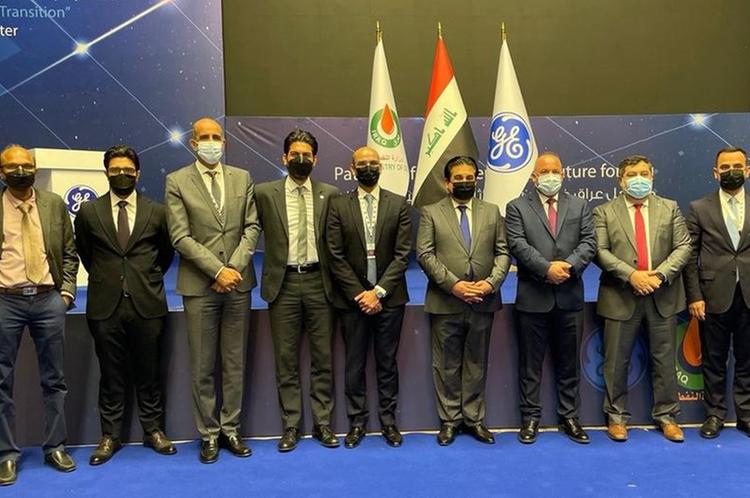The Iraqi Ministry of Oil and GE Gas Power (NYSE: GE) held a conference themed ‘Pathways for a Lower Carbon Future for Iraq’ at the Oil Cultural Center. The discussion focused on how Iraq could address the energy trilemma – simultaneously balancing the need for more reliable, affordable, and sustainable energy, while continuing to meet increasing demand. The event was attended by several senior Ministry officials and representatives of international missions to Iraq.
Iraqi Oil Minister H.E. Ihsan Abdul Jabbar said, “Iraq has reaffirmed its commitment to reducing carbon emissions through investments in the gas sector, the development of gas fields, and by leveraging solar power. Several contracts have been signed with specialized international companies such as France’s Total, Norway’s Scatec, and UAE’s Masdar. We are keen to develop gas fields and implement a strategic plan to increase the production of natural gas while also reducing flaring.”
Commending the ongoing efforts, he added, “Helping Iraq implement clean and renewable energy projects through continuous studies, workshops, and conferences has led to critical discussions around innovative methods in producing clean energy. This was also addressed in the conference with GE where we explored the latest developments in clean energy production, how to reduce the use of fossil fuels, as well as cut emissions, and contribute to the country’s sustainable development.”
GE presented a roadmap to support Iraq’s energy transition that focused particularly on the following:
- Using flared gas for power generation: Iraq can utilize gas that is currently flared to produce over 13 gigawatts (GW) of electricity, which can be used to power up to 15 million Iraqi households.
- Conversion of simple cycle assets to combined cycle: Converting simple cycle power plants to combined cycle operations could help enhance efficiency by up to 50 percent, leading to significant fuel savings and decreasing GHG emissions intensity by up to 35 percent. GE estimates that this solution, if applied to 19 different sites in Iraq today, can provide approximately 5.3 GW of additional power over a 4-year period without burning additional fuel.
- Hydrogen for power generation, and deployment of post combustion carbon capture, utilization, and storage (CCUS) technologies: Hydrogen to fuel power plants and/or adopting CCUS solutions in the future could lead to potential near-zero carbon emissions in the long term. GE has over 100 units worldwide that have run fully or partially on hydrogen and accumulated over 8 million operating hours. Many of the GE-built B, E and F-class gas turbine units in Iraq, can also be modified to burn up to 100% by volume of hydrogen.
“The world needs to move with speed with the solutions available today, while continuing to invest in the development of technologies of the future, to address the climate imperative. Accelerating Iraq’s energy transition will require a holistic approach that includes various fuel sources and efforts to decarbonize the entire energy value chain – from optimizing the extraction and transportation of resources, to power generation, transmission, distribution and consumption,” said Joseph Anis, President & CEO of GE Gas Power Europe, Middle East, and Africa. “Over the years, GE has provided end-to-end solutions to support Iraq’s energy sector, including bringing advanced technologies to the country, setting up and upgrading power plants, connecting them to the grid, and facilitating financing. While we have come a long way, we realize a lot more needs to be done to secure the country’s energy future for the generations ahead and we remain committed to supporting Iraq’s decarbonization goals.”
GE has supported the development of energy infrastructure in Iraq for over 50 years. The company has helped to build and service power plants and grid substations; rehabilitate power in areas across Iraq; install innovations such as the Advanced Gas Path (AGP) upgrade solution to enhance the performance of installed gas turbines; train local professionals servicing the power sector; and more. Together with the Iraqi Ministries of Planning, Finance, and Electricity, GE has also collaborated with various financial institutions to help obtain over $2.4 billion in funding since 2015 for energy sector projects in the country. Moreover, in support of community development projects, GE has collaborated with Kapita to support up to 50 microbusinesses owned by Iraqis to scale up further by providing grants, marketing support, and business training. In addition, the company has provided scholarships to five Baghdad Business School students.













